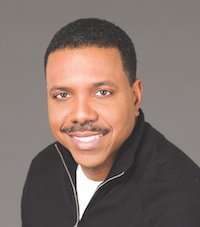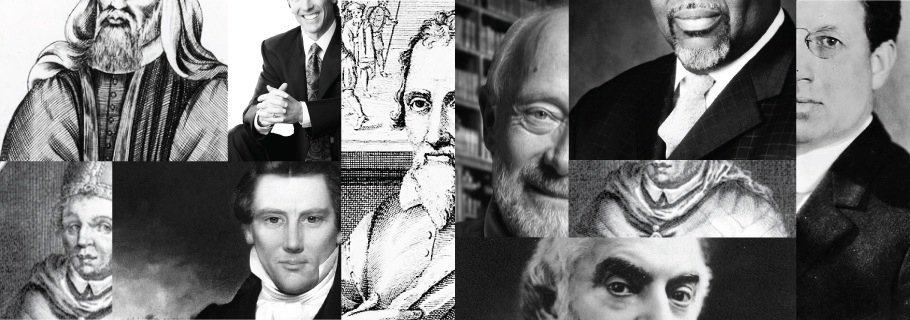A few months ago I set out on a series of articles through which I am scanning the history of the church—from its earliest days all the way to the present time—to examine some of Christianity’s most notable false teachers and to examine the false doctrine each of them represents. Along the way we have visited such figures as Joseph Smith (Mormonism), Ellen G. White (Adventism), Norman Vincent Peale (Positive Thinking), and Benny Hinn (Faith Healing). Today we turn to one of the chief proponents of the popular but sinister prosperity gospel.
Creflo Dollar
 Creflo Augustus Dollar, Jr. was born in College Park, Georgia on January 28, 1962. Though he was raised in a church-going home, he did not have a conversion experience until the summer following his freshmen year at West Georgia College. Even after this experience he felt no pull toward full-time ministry as his heart was set on being a professional football player. It was only after that football career was cut short by injury that he began to consider other options. In 1984 Dollar received a Bachelor of Science degree in education and soon began work as an educational therapist. The next year he married Taffi, with whom he would eventually have five children.
Creflo Augustus Dollar, Jr. was born in College Park, Georgia on January 28, 1962. Though he was raised in a church-going home, he did not have a conversion experience until the summer following his freshmen year at West Georgia College. Even after this experience he felt no pull toward full-time ministry as his heart was set on being a professional football player. It was only after that football career was cut short by injury that he began to consider other options. In 1984 Dollar received a Bachelor of Science degree in education and soon began work as an educational therapist. The next year he married Taffi, with whom he would eventually have five children.
While recovering from his football injury, Dollar had begun to lead Bible studies among his fellow students and he gained a reputation as a skillful and charismatic teacher. He called his study “World Changers Bible Study.” By 1986 he had determined that he was not meant to be a therapist but that the Lord was calling him into full-time preaching ministry.
He and Taffi founded a church and they held its inaugural worship service in an elementary school cafeteria. Only eight people attended that service, but the congregation soon grew and was renamed World Changers Church International (WCCI). In less than ten years the church had grown exponentially and Dollar’s sermons were being broadcast over the radio through Creflo Dollar Ministries. In 1995 WCCI moved to its current location, the 8,500-seat World Dome in College Park, Georgia, a suburb of Atlanta.
Today World Changers Church International serves nearly 30,000 members each week through the main campus, 6,000 through an affiliated congregation in New York City, and thousands more through many satellite campuses across America.
Dollar is known for his extravagant wealth which includes two multi-million dollar homes, expensive cars, and even a private jet. Creflo Dollar Ministries made headlines several years ago when it was one of six ministries audited by U.S. Senator Charles Grassley. “My goal,” he said, “is to help improve accountability and good governance so tax-exempt groups maintain public confidence in their operations.” The ministry was deemed uncooperative. MinistryWatch, an organization that reviews Christian ministries based on their financial accountability and transparency awarded Creflo Dollar Ministries an F rating and has added it to their Donor Alert listing. Dollar made headlines again in 2012 when his daughter called police to their home, charging that Dollar had choked and hit her. Dollar denied the charges which were dropped after he completed an anger-management program.
False Teaching: Prosperity Gospel
Creflo Dollar is one of the foremost proponents of what has become known as the prosperity gospel. This doctrine teaches that God has promised his people financial and other forms of prosperity in this life, if only God’s people will take the necessary steps to claim it. A uniquely American creation, this false teaching has since been exported across the world where it has especially taken root in the developing world. In one of his Bible studies Dollar lays it out:
As the righteousness of God, your inheritance of wealth and riches is included in the “spiritual blessings” (or spiritual things) the apostle Paul spoke of in Ephesians 1:5. Based on Psalm 112:3, righteousness, wealth and riches go hand—in—hand. You have every right to possess material wealth—clothes, jewelry, houses, cars and money—in abundance. It is that wealth that not only meets your needs, but also spreads the Gospel message and meets the needs of others.
The Bible says that wealth is stored up for the righteous (Proverbs 13:22, New American Standard). However, it will remain stored up until you claim it. Therefore, claim it now! You possess the ability to seize and command wealth and riches to come to you (Deuteronomy 8:18). Exercise that power by speaking faith-filled words daily and taking practical steps to eradicate debt. Like God, you can speak spiritual blessings into existence (Romans 4:17). Remember, doubt keeps silent, but faith speaks!”
The way such prosperity is activated is by the planting of seeds, so that the person who wants financial prosperity must plant a seed of financial prosperity. Needless to say, such seeds are usually through a donation to a ministry like Dollar’s.
You can say, “Oh, God, I need money! The rent is due. The baby needs shoes. And what about my breakthrough?” But if you haven’t sown financial seed, how can you expect a financial harvest?
If you wanted to grow apples, would you plant cucumber seeds or pumpkin seeds? You would not! So why do people expect to receive financial increase when they purposely plant anything and everything but what is needed? They will plant hope seed, shout seed, dance seed, and even “claim it” seed! All of these are good things, but alone and without the appropriate seed, they are unproductive.1
Followers & Adherents
Creflo Dollar is one of the most prominent and most successful teachers of prosperity theology. He preaches live to tens of thousands of people each weekend and his “Changing Your World” broadcast extends to nearly every country on earth. He publishes CHANGE magazine which has 100,000 subscribers, and he has written several bestselling books. His voice extends around the world and every week hundreds of thousands or even millions of people listen to him.
What the Bible Says
The foremost concern with the prosperity gospel is that in all its emphasis on financial prosperity, the deep need for spiritual prosperity is inevitably displaced and eventually lost altogether. In this way a relationship with Jesus Christ becomes little more than the key to unlocking temporal wealth and abundance. In his infamous song Fal$e Teacher$, Shai Linne says, “If you’re living your best life now you’re headed for hell!” David W. Jones and Russell Woodbridge helpfully distill the doctrinal errors of prosperity theology to five key points.
- The Abrahamic covenant is a means to material entitlement. Prosperity teachers look to God’s covenant with Abraham and see its fulfillment as providing material prosperity to Christians today. Dollar’s mentor Kenneth Copeland says, “Since God’s Covenant has been established and prosperity is a provision of this covenant, you need to realize that prosperity belongs to you now!”
- Jesus’ atonement extends to the “sin” of material poverty. They hold that Jesus’ atoning death provided not only for our spiritual needs but also for our financial prosperity. Thus it is only sin that keeps us trapped in poverty or anything less than abundant wealth.
- Christians give in order to gain material compensation from God. Creflo Dollar and others like him teach that giving to the Lord’s work is primarily a means of gaining further compension from God.
- Faith is a self-generated spiritual force that leads to prosperity. Many prosperity gospel preachers, Dollar among them, teach that we, like God, have the ability to speak reality into existence when we speak in faith. Thus faith becomes a force that allows us to speak prosperity into our lives.
- Prayer is a tool to force God to grant prosperity. Dollar writes, “When we pray, believing that we have already received what we are praying, God has no choice but to make our prayers come to pass. … It is a key to getting results as a Christian.” Thus prayer is little more than a means through which we bring about our desires for wealth.
Al Mohler says it well: “Prosperity theology is a False Gospel. Its message is unbiblical and its promises fail. God never assures his people of material abundance or physical health. Instead, Christians are promised the riches of Christ, the gift of eternal life, and the assurance of glory in the eternal presence of the living God. In the end, the biggest problem with prosperity theology is not that it promises too much, but that it promises far too little. The Gospel of Jesus Christ offers salvation from sin, not a platform for earthly prosperity. While we should seek to understand what drives so many into this movement, we must never for a moment fail to see its message for what it is — a false and failed gospel.”










